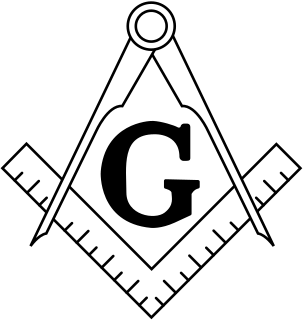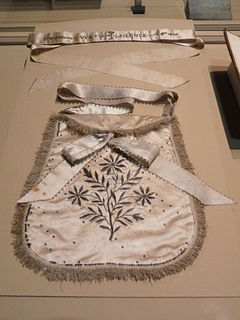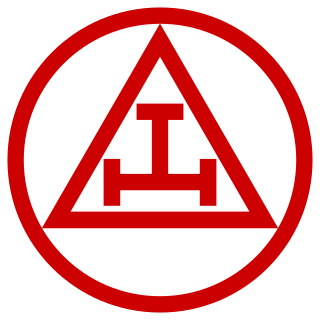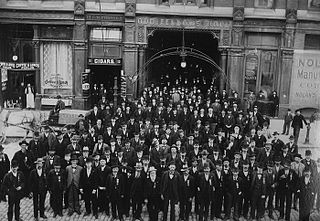
Freemasonry or Masonry consists of fraternal organisations that trace their origins to the local fraternities of stonemasons, which from the end of the fourteenth century regulated the qualifications of stonemasons and their interaction with authorities and clients. The degrees of Freemasonry retain the three grades of medieval craft guilds, those of Apprentice, Journeyman or fellow, and Master Mason. The candidate of these three degrees is progressively taught the meanings of the symbols of Freemasonry, and entrusted with grips, signs and words to signify to other members that he has been so initiated. The initiations are part allegorical morality play and part lecture. The three degrees are offered by Craft Freemasonry. Members of these organisations are known as Freemasons or Masons. There are additional degrees, which vary with locality and jurisdiction, and are usually administered by their own bodies.

The Ancient and Accepted Scottish Rite of Freemasonry, commonly known as simply the Scottish Rite, is one of several Rites of Freemasonry. A Rite is a progressive series of degrees conferred by various Masonic organizations or bodies, each of which operates under the control of its own central authority. In the Scottish Rite the central authority is called a Supreme Council.
The York Rite is one of several Rites of Freemasonry. A Rite is a series of progressive degrees that are conferred by various Masonic organizations or bodies, each of which operates under the control of its own central authority. The York Rite specifically is a collection of separate Masonic Bodies and associated Degrees that would otherwise operate independently. The three primary bodies in the York Rite are the Chapter of Royal Arch Masons, Council of Royal & Select Masters or Council of Cryptic Masons, and the Commandery of Knights Templar, each of which are governed independently but are all considered to be a part of the York Rite. There are also other organizations that are considered to be directly associated with the York Rite, or require York Rite membership to join such as the York Rite Sovereign College but in general the York Rite is considered to be made up of the aforementioned three. The Rite's name is derived from the city of York, where, according to a Masonic legend, the first meetings of Masons in England took place, although only the lectures of the York Rite Sovereign College make reference to that legend.

Canadian Confederation was the process by which the British colonies of Canada, Nova Scotia, and New Brunswick were united into one Dominion of Canada on July 1, 1867. Upon confederation, the old province of Canada was divided into Ontario and Quebec; along with Nova Scotia and New Brunswick, the new federation thus comprised four provinces. Over the years since Confederation, Canada has seen numerous territorial changes and expansions, resulting in the current union of ten provinces and three territories.
Canadian federalism involves the current nature and historical development of federal systems in Canada.
The Societas Rosicruciana is a Rosicrucian order which limits its membership to Christian Master Masons. The order was founded in Scotland, but now exists in England, Scotland, Canada, France, Portugal, Romania, Ireland and the United States. While a prospective member must be a Trinitarian Christian Master Mason in good standing with a Grand Lodge that is recognized by the Grand Lodge of the jurisdiction in which the Society meets, the various Societies have no other Masonic links, ties, or official recognition. Additionally, in a few jurisdictions membership is by invitation only. As the Society offers assistance to all its members in working out the great problems of nature and science, it functions in some respects as a research society.

The Constitution Act, 1867 is a major part of Canada's Constitution. The Act created a federal dominion and defines much of the operation of the Government of Canada, including its federal structure, the House of Commons, the Senate, the justice system, and the taxation system. The British North America Acts, including this Act, were renamed in 1982 with the patriation of the Constitution ; however, it is still known by its original name in United Kingdom records. Amendments were also made at this time: section 92A was added, giving provinces greater control over non-renewable natural resources.

A benefit society, fraternal benefit society or fraternal benefit order is a society, an organization or a voluntary association formed to provide mutual aid, benefit, for instance insurance for relief from sundry difficulties. Such organizations may be formally organized with charters and established customs, or may arise ad hoc to meet unique needs of a particular time and place. Many major financial institutions existing today, particularly some insurance companies, mutual savings banks, and credit unions, trace their origins back to benefit societies, as can many modern fraternal organizations and fraternal orders which are now viewed as being primarily social; the modern legal system essentially requires all such organizations of appreciable size to incorporate as one of these forms or another to continue to exist on an ongoing basis.
Co-Freemasonry is a form of Freemasonry which admits both men and women. It began in France in the 1890s with the forming of Le Droit Humain, and is now an international movement represented by several Co-Freemasonic administrations throughout the world. Most male-only Masonic Lodges do not recognise Co-Freemasonry, holding it to be irregular, or clandestine.

The Benevolent and Protective Order of Elks is an American fraternal order founded in 1868 originally as a social club in New York City. Membership was originally restricted to white men, but the organization now has a more inclusive membership policy.

There are many organisations and Orders which form part of the widespread fraternity of Freemasonry, each having its own structure and terminology. Collectively these may be referred to as Masonic bodies, Masonic orders or appendant bodies of Freemasonry.

Freemasonry and women have a complex relationship, which can be readily divided into many phases with no demonstrable relationship to each other until the 20th century. A few women were involved in Freemasonry before the 18th century; however the first printed constitutions of the Premier Grand Lodge of England appeared to bar them from the Craft forever.

The Holy Royal Arch is a degree of Freemasonry. The Royal Arch is present in all main masonic systems, though in some it is worked as part of Craft ('mainstream') Freemasonry, and in others in an appendant ('additional') order. Royal Arch Masons meet as a Chapter; in the Supreme Order of the Holy Royal Arch as practised in the British Isles, much of Europe and the Commonwealth, Chapters confer the single degree of Royal Arch Mason.
The Allied Masonic Degrees (AMD) are a series of Masonic degrees conferred by Councils of the Allied Masonic Degrees. The Allied Masonic Degrees form an appendant order of Freemasonry that exists in some Masonic jurisdictions; its degrees are conferred only by invitation. Councils of the Allied Masonic Degrees exist in Great Britain, the United States, Canada, France and Australia and their members also educate one another by presenting research papers on Freemasonry.

The Ancient Order of United Workmen (AOUW) was a fraternal organization in the United States and Canada, providing mutual social and financial support after the American Civil War. It was the first of the "fraternal benefit societies", organizations that would offer insurance as well as sickness, accident, death and burial policies.
Lt. Col. Alexander Allan Stevenson was a Canadian businessman, politician and military officer.











